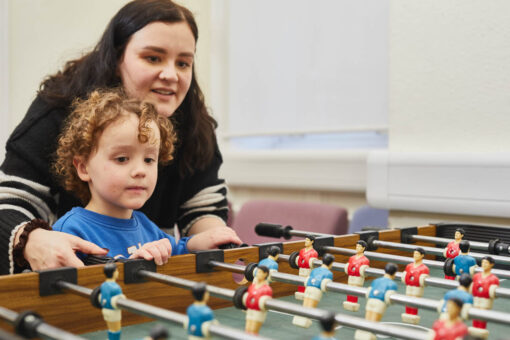Changing narratives: Leadership – showing others what they can do

Kyrene Darko, is a team manager in a family safeguarding team in Hertfordshire. She completed the Firstline programme in 2021-2022.
Kyrene has an abundance of energy and charisma, her approach to leadership exteriorises in her rooting for her team to be their best for themselves and for the children and families they help.
When it comes to creating positive change for children and families, we need the confidence to ask the right questions in the right way and then using that information to make appropriate decisions.
One of the principles that really stayed with me from the Firstline programme is that leadership isn’t about showing others what you can do, it’s about showing others what they can do. That approach helped to boost my confidence in my own decision making and professional judgement and motivated me to look at how I can use my position as a leader to forge an environment where people can grow and put their best selves forward. This translated into me really focusing on trusting my team, encouraging them to trust their own decision making and supporting their professional development. This is important because when it comes to creating positive change for children and families, we need the confidence to ask the right questions in the right way and then using that information to make appropriate decisions. I feel that the impact of my leadership style now is my team being better able to function without me over periods when I’m away, and their confidence in their own leadership skills has developed because of my confidence in them.
We often speak about how important it is for children to see representation and to see people in successful positions that look like them and represent them so that they feel that they can have similar achievements.
As a black female in management, it’s a great experience to lead others. But there are also challenges that can come with that, including feelings of imposter syndrome. We often speak about how important it is for children to see representation and to see people in successful positions that look like them and represent them so that they feel that they can have similar achievements. I think it’s the same for adults and it’s no different for social workers. I feel lucky that I was able to grow up with my mother who’s a social work manager and I’ve had managers and mentors that look like me and or have a similar value base to me. And I think that’s really helped my own growth in social work. But I’m mindful that not everybody has that experience and I just think it’s important that as a workforce we keep having these conversations. What was really refreshing about the Firstline programme was having space where conversations about diversity and inclusion just had to happen and it was good to see people engage with them openly and honestly. The session by one of the speakers, Jeffrey Wotherspoon, around social graces honestly transformed my practice because it gave me permission to have those conversations within the workplace. Since then, I’ve been able to have a lot more open conversations about identity and how social graces impacts our work within the diverse team that I manage in my local authority. What has evidenced as a result is that social workers in my team are a lot more open to discussing similarities, differences, social graces, and aren’t shying away from these conversations. Some realisations that came from that led to improving the practice of the social workers in my team through honing their ability to reflect and I’m really pleased and proud to see that.
I would love to see social workers being a little bit louder and prouder about the profession and the work that they’re doing.
A big thing I hope to see in the next ten years is a real shift in the way that social workers are perceived in the media and how this then effects how professionals perceive themselves and the profession in general. I would love to see social workers being a little bit louder and prouder about the profession and the work that they’re doing. I would also love to see social workers developing and prioritising their own professional development because I think developing their own skill set and building their own leadership skills and confidence will positively impact the work that they do with families. That’s certainly been the case for me.
That’s why I’d encourage as many managers or leaders as possible to go on to the Pathways programme if they can. It was a really refreshing experience for me to come out of my day-to-day work set in and spend time with likeminded professionals who are passionate about leadership.